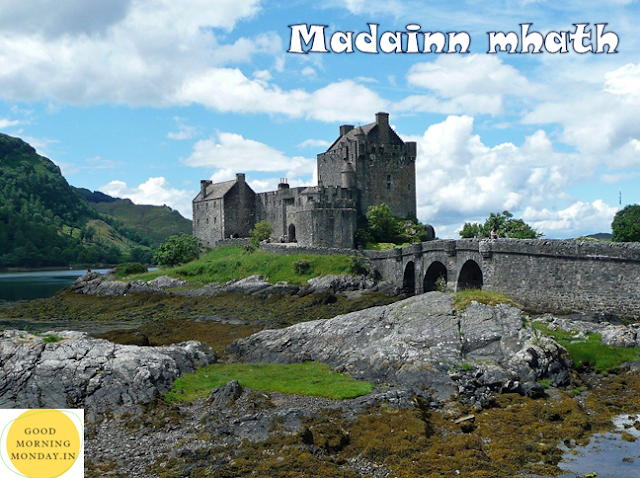How to say [ good morning ] in Scots Gaelic Language ( Scottish Gaelic and Goidelic Language )
How to say [ good morning ] in Scots Gaelic Language ( Scottish Gaelic and Goidelic Language )
Peoples are searching for How to say [ good morning ] in Scots Gaelic Language ( Scottish Gaelic and Goidelic Language ) Scots Gaelic Language is also known as Scottish Gaelic and Gaelic, is a Goidelic language in the Celtic branch of the Indo-European language native to the Gaels of Scotland. According to report 87 millions native speakers in Scots Gaelic language globally.
Scots Gaelic Language Scotland Act 2005 gained royal assent in June of that year, confirming Scots Gaelic as an official language of Scotland.
The Romans called the Gaels Scotti and they eventually spread the Gaelic language throughout most of Scotland. The oldest remains of Ancient Irish that we have are inscriptions on Ogham stones from the 5th and 6th centuries.
Scots Gaelic is a recent offshoot of the Irish language. Introduced into Scotland about ad 500 (displacing an earlier Celtic language), it had developed into a distinct dialect of Gaelic by the 13th century. A common Gaelic literary language was used in Ireland and Scotland until the 17th century.
Its origins can be traced back as far as the 10th Century and it is believed to have been brought to Scotland by way of Ireland. From these beginnings, Gaelic spread throughout the country, becoming the main language of the medieval kingdom of Alba and remained that way right through until the 18th Century.
Tha daoine a’ sireadh Mar a chanas tu [ madainn mhath ] ann an Gàidhlig na h-Alba ( Scottish Gaelic and Goidelic Language ) Canar Gàidhlig na h-Alba agus Gàidhlig cuideachd, cànan Goidelic anns a’ mheur Cheilteach den chànan Ind-Eòrpach a tha dùthchasach dha. Gaidheil na h-Alba. A rèir aithisg tha 87 millean neach-labhairt dùthchasach ann an Gàidhlig na h-Alba air feadh na cruinne.
Fhuair Achd Gàidhlig na h-Alba Alba 2005 aonta rìoghail san Ògmhios a’ bhliadhna sin, a’ dearbhadh Gàidhlig na h-Alba mar chànan oifigeil na h-Alba.
Thug na Ròmanaich ainm air na Gàidheil Scotti agus mu dheireadh sgaoil iad a’ Ghàidhlig air feadh a’ mhòr-chuid de dh’ Alba. Is e na tha air fhàgail den t-Seann Ghaeilge a th’ againn na sgrìobhaidhean air clachan Ogham bhon 5mh agus an 6mh linn.
Tha Gàidhlig na h-Albannach air tighinn gu ìre na Gaeilge o chionn ghoirid. Air a toirt a-steach a dh’Alba mu ad 500 (a’ dol an àite cànan Ceilteach na bu thràithe), bha i air fàs gu bhith na dualchainnt shònraichte de Ghàidhlig ron 13mh linn. Bha cànan litreachais Gàidhlig cumanta air a cleachdadh ann an Èirinn agus Alba chun an t-17mh linn.
Faodar a thùs a lorg air ais cho fada ris an 10mh linn agus thathas a’ creidsinn gun deach a thoirt a dh’Alba tro Èirinn. Bhon toiseach sin, sgaoil a’ Ghàidhlig air feadh na dùthcha, agus thàinig i gu bhith na prìomh chànan ann an rìoghachd meadhan-aoiseil na h-Alba agus dh’fhan i mar sin suas chun an 18mh linn.
